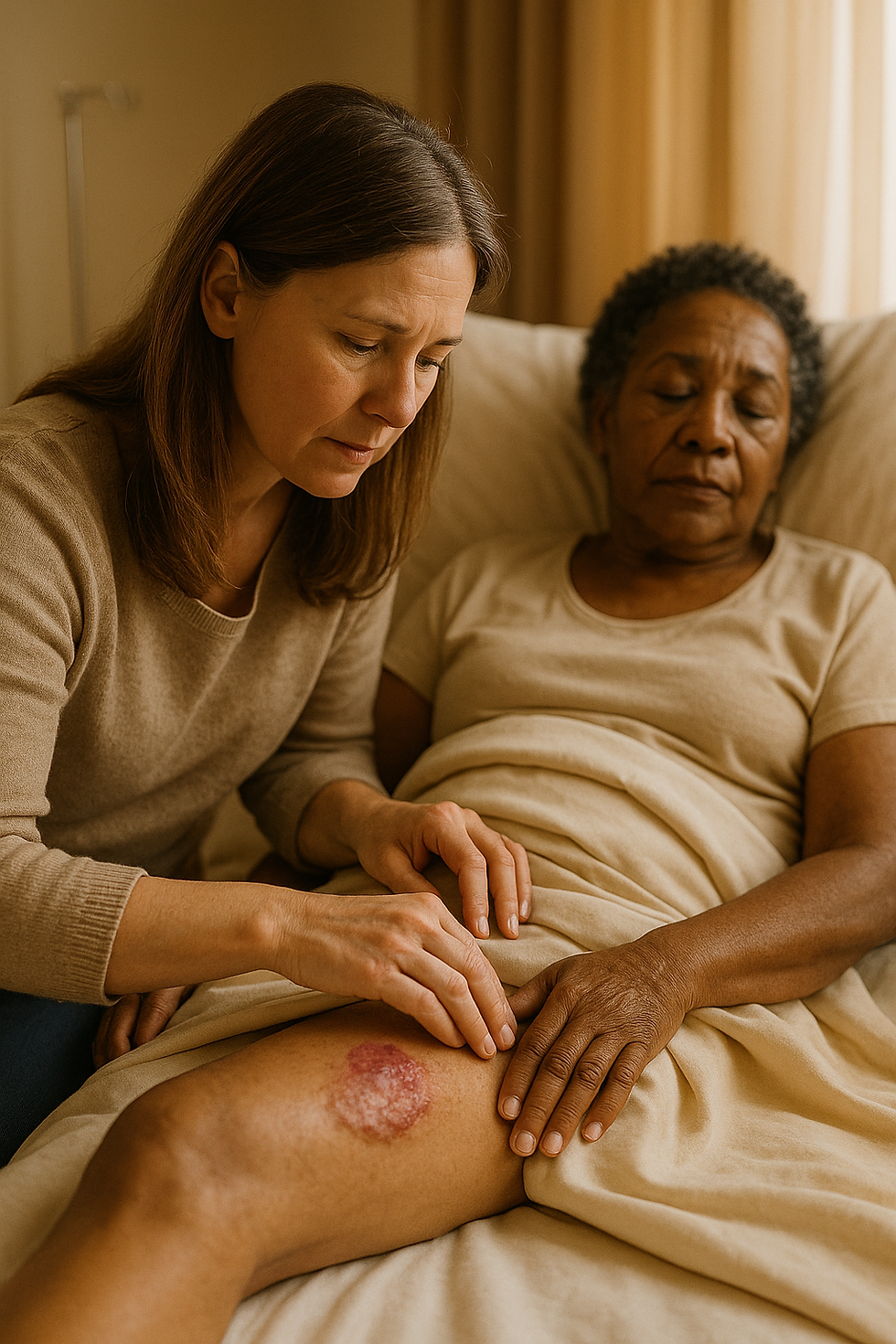The Hardest Conversation You’ll Ever Have—And Why You Shouldn’t Wait
- Franklin Saavedra

- May 23, 2025
- 5 min read
Updated: Jun 24, 2025
“What would they want me to do?”
That question haunts more families than any diagnosis. It’s whispered in hospital rooms. It’s asked through tears at 2 a.m. in emergency waiting areas. And too often—it’s asked too late.
As a former nurse, I’ve sat beside many bedsides in those final moments. I’ve witnessed the heartbreak of children trying to guess their parent’s wishes. And I’ll never forget Margaret.
She was quiet, gentle, and organized. I cared for her during her last weeks, and her daughter—sweet, devoted, and utterly torn—was at her side every day. But when Margaret slipped into a coma, her daughter didn’t know if she would want life support. There was no written directive. No conversation. Only the agonizing weight of decisions that couldn’t be undone.
What if I told you the greatest gift we can give our loved ones isn’t just care—but clarity?

Why End-of-Life Planning Isn’t Morbid—It’s Loving
Talking to the elderly about death doesn’t mean giving up. It means honoring their autonomy. It’s about empowering them to have a say in what happens when they can no longer speak for themselves.
When you ask someone if they want to be cremated or buried, if they’d prefer a celebration of life or a traditional service, or what kind of care they’d want in a medical emergency—you’re not being insensitive. You’re showing up for them. You’re giving them a voice.
Key Topics to Discuss With Your Loved One
1. Life Support and Medical Intervention
Would your loved one want to be placed on a ventilator, feeding tube, or dialysis if their body couldn’t function on its own? What if there was only a slim chance of recovery? Having these preferences in writing helps healthcare providers and families make aligned, compassionate choices. 👉 Living Will & Advance Directive Kit (Paid link)– A legally binding document you can complete together that outlines specific healthcare wishes.
2. Funeral and Burial Preferences
Do they want a traditional church funeral or a quiet backyard celebration? A casket or cremation urn? Would they like music played or stories told? These decisions deeply affect grieving families. Pre-discussing them can ease the emotional burden later. 👉 Ever Loved – Create a Free Funeral Plan – A free service that allows you to pre-plan and document all funeral preferences so your family isn’t left guessing.
3. Do Not Resuscitate (DNR) Orders
A DNR tells healthcare providers not to perform CPR or other life-saving measures in the event of cardiac or respiratory arrest. It’s a deeply personal decision, often based on quality-of-life expectations or religious beliefs. Some choose it only under specific conditions. 👉 State-Specific DNR Forms and Info – Includes legally appropriate documents and instructions by state.
4. Organ and Tissue Donation
Are they open to donating organs to save other lives? Or corneas for someone to see again? Knowing this ahead of time can ensure their wishes are honored and remove ambiguity for grieving relatives. 👉 Organ Donor Registration – Donate Life America – Official U.S. registry for organ and tissue donors.
5. Legacy and Memory Wishes
Do they want to leave letters for their grandchildren? Have a recipe book passed down? Is there a cause they’d like mourners to donate to in their name? These small, thoughtful touches can keep their memory alive in meaningful ways. 👉 The Memory Jar Journal (Paid link)– A guided journal to preserve favorite memories, values, and messages to family.
How to Start the Conversation
Pick a quiet moment when you’re not rushed.
Lead with love: “I want to honor your wishes and not make assumptions if something ever happens.”
Don’t rush it. Let them think. Give space.
Offer to write things down together or use a planning tool.
Final Thoughts
Margaret’s daughter did her best. But she always wondered if she chose right.
These conversations won’t prevent grief. But they will prevent regret.
Have the conversation while there’s time. Give the gift of certainty. And most importantly—listen.
With compassion,
Rebecca Saavedra
Former Nurse | Educator
P.S. If you like my content, subscribe to my newsletter at the bottom of the page for more in-depth articles.
FAQ: End-of-Life Planning Questions Families Are Searching For
1. What are the most important questions to ask aging parents about end-of-life care?
Start with: Do you want life support if you're critically ill? Would you prefer to be at home or in a hospital? What are your wishes for burial or cremation? Do you have a will or advance directive?
2. How do I talk to my parents about end-of-life planning without upsetting them?
Choose a calm moment. Express love, not fear: “I want to make sure I honor your wishes when the time comes.” Let them know it's not about giving up—it's about giving them a voice.
3. What is the difference between a living will and an advance directive?
A living will outlines specific medical treatments someone does or doesn’t want if they’re incapacitated. An advance directive can include a living will and designate a healthcare proxy to make decisions.
4. When should I ask my loved one about a Do Not Resuscitate (DNR) order?
Ask before a health crisis. The best time is when they are stable and able to reflect on what quality of life means to them. Waiting until it’s too late can lead to confusion or conflict.
5. How do I create a legally valid end-of-life plan for my parents?
Use state-specific advance directive forms or online kits. Notarize documents when required and store copies in easily accessible locations for family and doctors.
6. What are the best end-of-life planning tools or kits for families?
Look for all-in-one kits that include a living will, healthcare proxy, funeral planning guide, and digital password organizer. Online services like “Ever Loved” and “Five Wishes” are great options.
7. Why is funeral pre-planning important for families?
It reduces stress during grief, avoids family conflict, and ensures your loved one's values are honored. From music and readings to burial preferences, it removes guesswork.
8. Can I talk to my loved one about organ donation without offending them?
Yes, especially if framed as a gift of legacy and compassion. Share facts from trusted sources like Donate Life America, and respect their beliefs and comfort levels.
9. How can I record my parent’s end-of-life wishes in a way doctors will accept?
Document preferences in a signed advance directive or living will, and provide copies to healthcare providers, family members, and hospital systems when possible.
10. What are legacy planning ideas that go beyond financial wills?
Encourage your loved one to write letters, record memories, pass down family recipes, or create a memory journal. These emotional heirlooms often mean the most after they're gone.
Affiliate Disclaimer:As an Amazon Associate, I earn from qualifying purchases. I only recommend products I believe in, and all links marked "(Paid link)" help support this blog at no additional cost to you.
Note: Before starting any supplement routine, consult your doctor or healthcare provider to ensure they’re appropriate for your specific medical needs. While I share science-backed, general wellness information, I’m not your personal physician. I don’t have access to your health history or prescriptions and cannot predict how supplements may interact with your current medications or conditions.


Comments